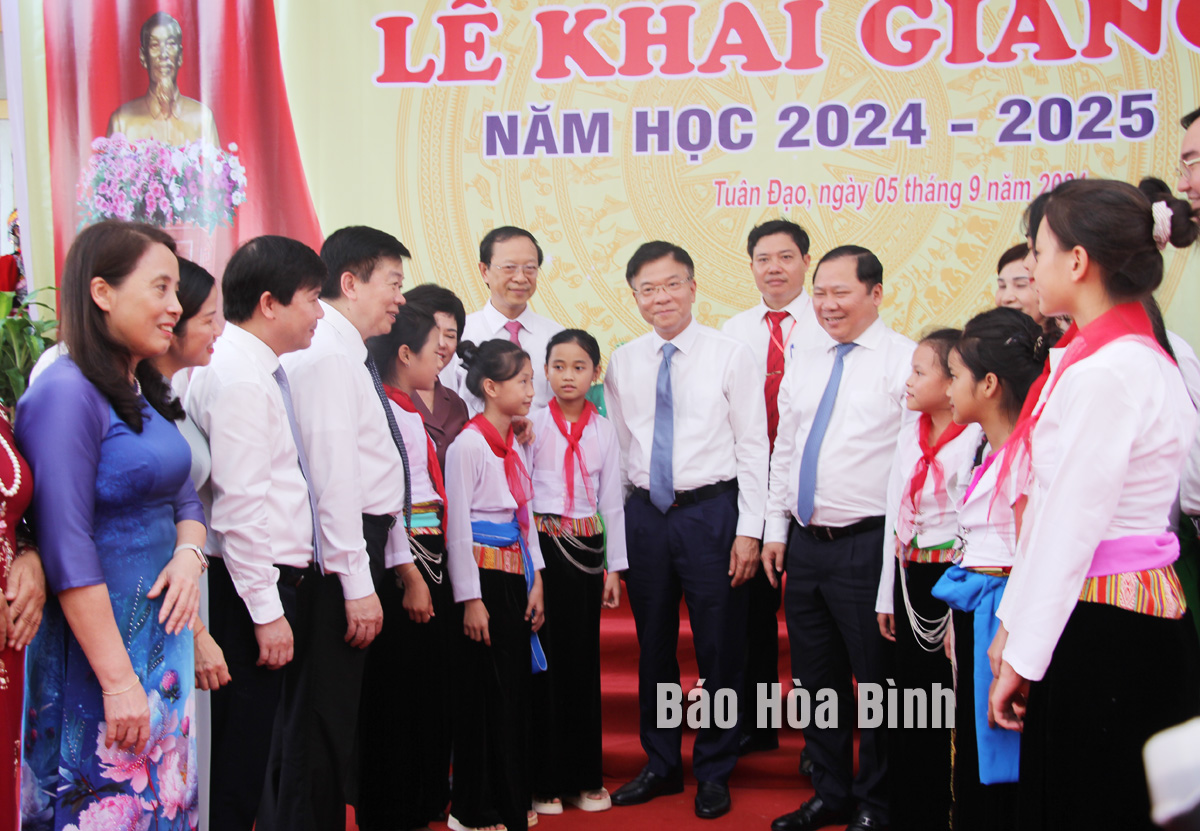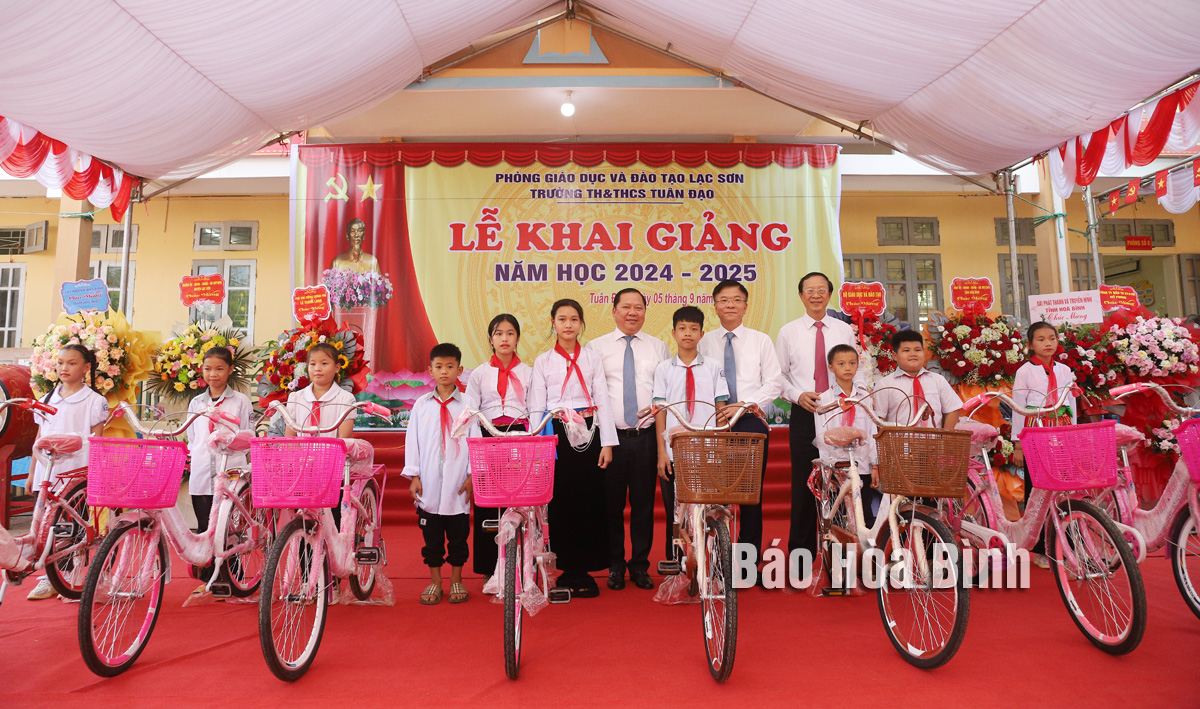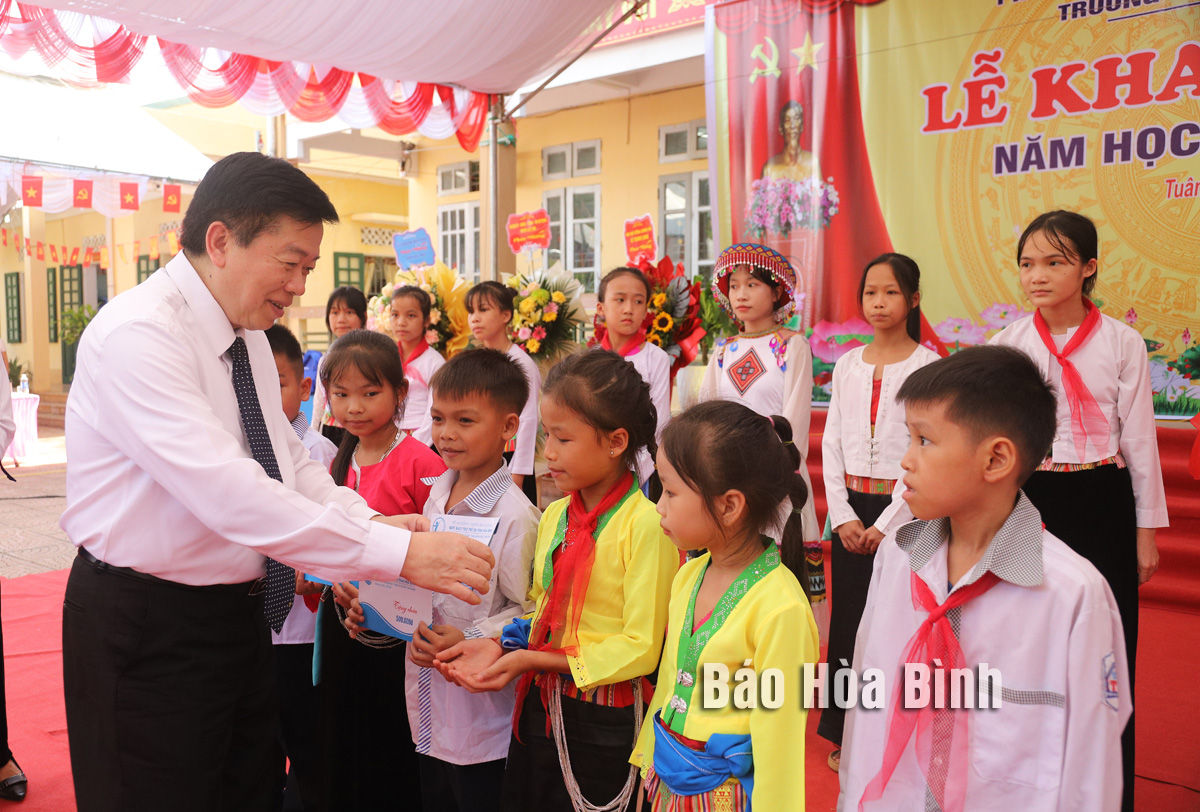
Member of the Party Central Committee, Deputy Prime Minister Le Thanh Long on September 5 morning attended the opening ceremony of the 2024-2025 school year at Tuan Dao Primary and Secondary School in Lac Son district.
Deputy Minister of Education and Training Pham Ngoc Thuong,
alternate member of the Party Central Committee and Secretary of the provincial
Party Committee Nguyen Phi Long, and Vice Chairman of the provincial People's
Committee Nguyen Van Chuong were among guests at the ceremony.
Deputy Prime
Minister Le Thanh Long, Secretary of the Hoa Binh provincial Party Committee
Nguyen Phi Long and delegates share joy with teachers and students of Tuan Dao
Primary and Secondary School in Lac Son district.
In the 2023-2024 school year, Tuan Dao school had 18 outstanding students
recognised at the district level and three excellent students at the provincial
level.
The school focused on innovating teaching methods and forms, putting students
at the centre and promoting their activeness, which led to positive results in
education quality.
Deputy Prime
Minister Le Thanh Long, Secretary of the Hoa Binh provincial Party Committee
Nguyen Phi Long and representatives from the Ministry of Training and Education
present bicycles to disadvantaged students with good academic performance at
Tuan Dao Primary and Secondary School.
Vice Chairman of
the Hoa Binh Provincial People's Committee Nguyen Van Chuong presents
scholarships from the provincial Children Protection Fund and school supplies
to students.
Speaking at the opening ceremony, Deputy Prime Minister Le Thanh Long praised
the achievements that the education sector, teachers, staff, and students in
the province in general, and Tuan Dao Secondary and High School in particular,
made in the past school year.
He emphasized that promoting education and training is the
responsibility of all levels, sectors, families, and schools, contributing to
providing high-quality human resources for the homeland’s development.
Long asked education managers and teachers to continue upholding the
educational principles that learning goes hand in hand with practice; and
schools, families and society work together to improve the quality of
education.
He urged the education sector to develop digital education,
smart education, personal education, creative education, and equip students
with essential skills to learn and work effectively.
Each teacher and educational officer must be an example of
morality, self-study, self-training, and dedication to the younger generation,
he said, urging students to cultivate morality, and learn the history and
culture of their homeland in particular and Vietnam in general.
The Deputy PM requested the Ministry of Education and Training,
Party committees at all levels, authorities, organisations, families and
communities in the province to continue to pay attention to and make
appropriate investments in the development of education in remote, isolated and
most disadvantaged areas to ensure fairness in education.
At the ceremony, Deputy PM Long and Secretary of the provincial Party Committee
Nguyen Phi Long presented five sets of computers to Tuan Dao school. They also
gave bicycles to 20 students and 20 scholarships for the disadvantaged students
who have overcome difficulties.
Vice Chairman of the provincial People's Committee Nguyen Van
Chuong presented 20 scholarships from the provincial Children Protection Fund
and 20 sets of school supplies to the school's students. Leaders of
departments, branches and Lac Son district presented many meaningful gifts to
the school's students on this occasion.
The Standing Board of the Hoa Binh provincial Party Committee has agreed in principle on a proposal by the Standing Board of the Party Committee of Hoa Binh city to gather feedback on the city’s 1:2000 zoning plan, which forms part of its broader urban development strategy.
Hoa Binh province has made notable progress in public administration reform and digital government development, with the satisfaction index among citizens and businesses reaching over 84%, according to recent government evaluations.
Thanks to great efforts by local authorities in recent times, the governance and public administration performance of Mai Chau district has been significantly improved.
In the afternoon of June 6, the Party Committee, the People's Council, the People's Committee and the Fatherland Front of Lac Son district solemnly held a meeting to celebrate the 139th anniversary of the district's founding (1886–2025) and the 79th anniversary of the establishment of the district's Party Committee (1946–2025). There was the attendance of Mr. Bui Van Thang, the Vice Chairman of the Provincial People's Council; Mr. Quach Tat Liem, the Vice Chairman of the Provincial People's Committee; Ms. Dang Bich Ngoc, the Deputy Head of the National Assembly Delegation of the province; as well as the former leaders of the province and district through various periods, who are the natives of the district.
Implementing the Politburo’s Resolution No. 57-NQ/TW on breakthroughs in science – technology, innovation, and digital transformation is a golden opportunity for the northern mountainous province of Hoa Binh to renew growth model, improve competitive edge and shorten digital gap.
Resolution 57-NQ/TW, issued by the Politburo on December 22, 2024, identifies sci-tech, innovation, and digital transformation as strategic breakthroughs to build a developed and prosperous nation. In Hoa Binh province, this spirit is not just a slogan, it’s being put into action through concrete initiatives that form a "new development triangle”: digital citizenship, digital economy, and digital administration.





